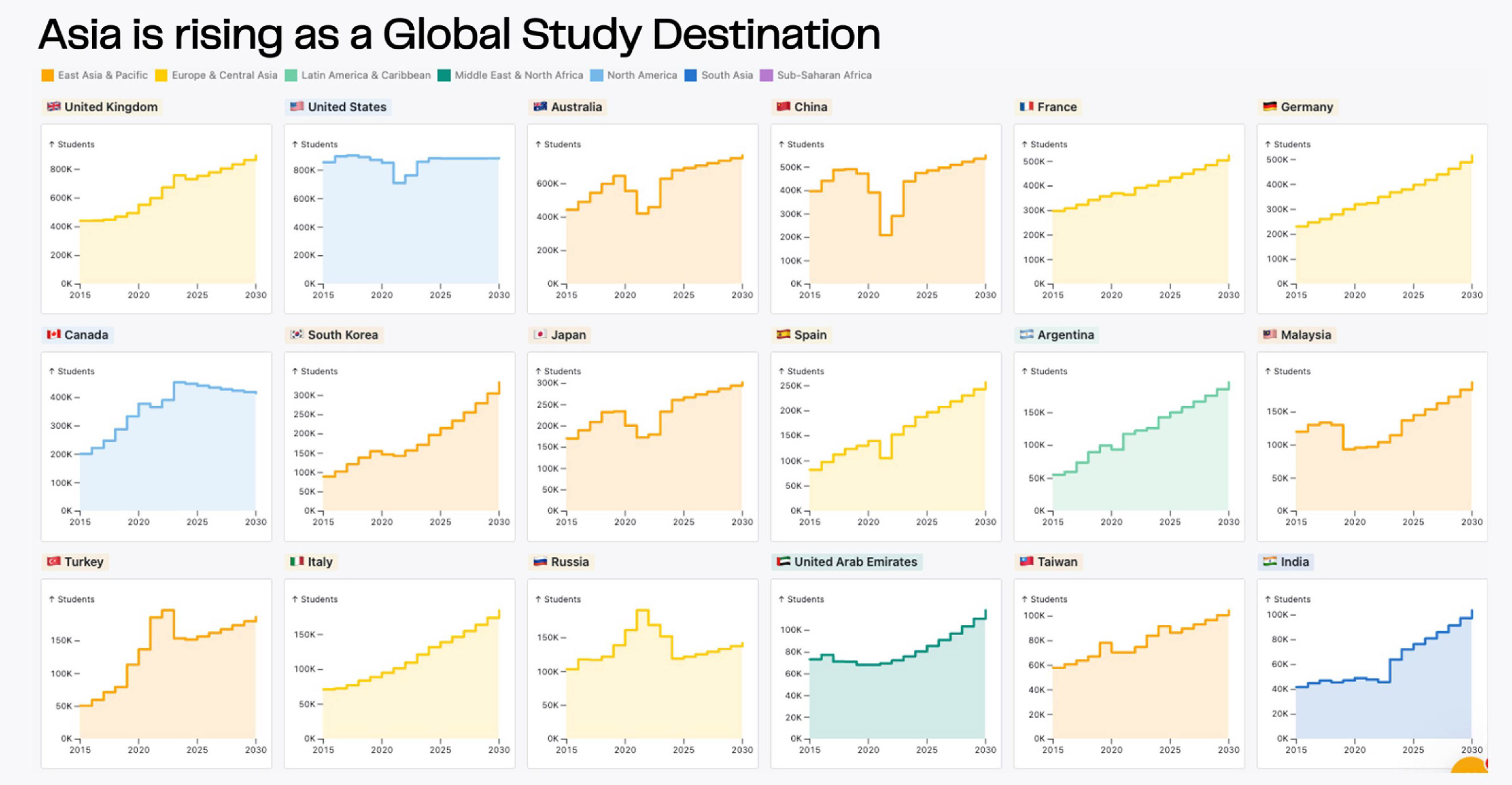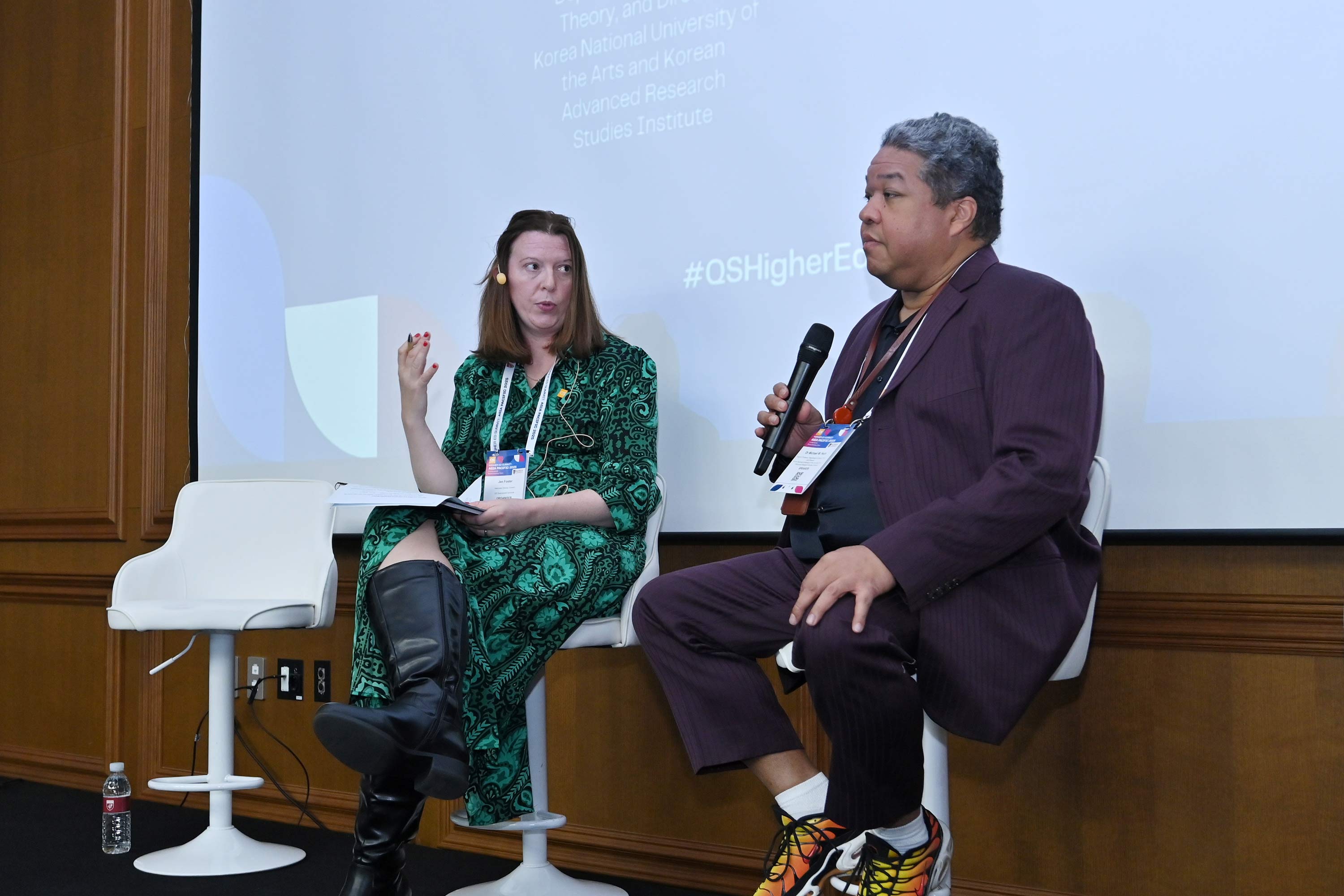Summary:
- The QS Higher Ed Summit: Asia Pacific 2025 brought together over 1,500 delegates and 180 speakers across three days at Korea University. We celebrated significant progress by universities across the region and to amplify emerging opportunities for success.
- His Excellency Ban Ki-moon, Eighth Secretary General of the United Nations, spoke about the importance of education and global citizenship in solving the world's challenges.
- The Asia Pacific region is increasing prominence across QS World University Rankings, and is the centre of global transformation of higher education and the workforce.
"Asia Pacific is where it's happening"
Asia Pacific is home to some of the world’s fastest-growing student populations and now ten of the world’s top twenty student cities. Seoul – our host for QS Higher Ed Summit: Asia Pacific 2025 – leads that list as #1.
In his keynote, our guest-of honour His Excellency Ban Ki-moon, 8th Secretary General of the United Nations, spoke of the importance of global citizenship, emphasising that “no single nation or institution” can solve the world’s challenges alone.
He said: “This is an invaluable opportunity to exchange ideas for partnerships and inspire concrete actions. Above all, it reminds us that higher education is not the privilege of a few, but a shared responsibility of all humanity around the world.”
His resounding message focused on seizing opportunities for international collaboration, noting that the measure of true leadership across universities, government and industry should be “how many lives we uplift, how much potential we unlock, and how deeply we contribute to humanity’s progress by advancing generational potential.”

A story of transformation
In his opening presentation, QS Executive Director Patrick Brothers zoomed out on the bigger picture of trends and developments in Asia Pacific, describing the region as "the centre of the global transformation of higher education and the workforce". He explained that the region has powered the majority of the world's climb in international student mobility, and added “Asia Pacific is where it’s happening.”
Asia Pacific sees a substantial number of new entrants (554) eligible to be included in the latest QS World University Rankings: Asia 2026 and across the 25 locations represented, 266 universities see an upward movement. As such, this year’s Summit – in the world’s top student city, Seoul – is a time of celebration and of building momentum.
As he revealed the QS World University Rankings: Asia 2026 to delegates, Ben Sowter, QS Senior Vice President, said: “Asia Pacific’s remarkable achievements in the Rankings reflects a story of transformation powered by visionary investment, forward-looking policy, and an enduring belief in education as the most powerful engine of progress.”

Responding to the growth in visibility and reputation of Asia Pacific
On day two of the Summit, we launched our latest QS report, exploring how universities are shaping ASEAN’s future. Key findings reveal that universities in many ASEAN countries are climbing in global rankings, with Malaysia and Indonesia making notable strides into the QS World University Rankings top 250 between 2016 and 2026. This increased visibility influences partnerships, investment, and talent flows.
While Singapore remains the established leader, other countries are beginning to see meaningful progress, highlighting ASEAN’s emergence as a credible higher education hub. So how are universities responding?
For Dr Trang Ly Thien, Vice President of Ho Chi Minh City University of Technology (HUTECH), focus must be increasingly placed on maximising Asia’s dominance in innovation and employability opportunities.
She said: “The innovation in Asia dominates higher education. You can see that in Asia, especially Southeast Asia, where we are focused most on outcome-based curricula and creating meaningful industry-led experiences for students. The young generation is also digitally dynamic and actively engaging in digital transformation. We must make the most of this shift if we want to remain agile in the global market.”
The President of Sunway University, Professor Sibrandes Poppema, highlighted that while industry often claims Malaysia needs more graduates, the real challenge lies in creating more high-level, value-added jobs.
He said: “Malaysian universities already prioritise employability, but the key question is whether the jobs available truly reflect the value of higher education. Malaysia is striving to move up the value chain, particularly in sectors like semiconductors, and must take the necessary gamble to invest in future skills despite current economic constraints. Universities play a crucial role in this transformation — training talent for the industries of tomorrow, not just meeting today’s demands.”
Seizing the skills opportunity
The latest data from QS reveals that skills and employability alignment could generate US$900 billion in additional value across the ASEAN region and even more across Asia Pacific (How universities are shaping ASEAN’s future).
In his Opening Remarks, Dong-One Kim, President at Korea University and our host for the Summit, shared that “technology is not our most valuable resource but the scientists, thinkers and innovators. It is our sole duty to prepare them with the skills and values to build a better world.”
Eduardo Pedrosa, Executive Director for Asia Pacific Economic Committee (APEC) also emphasised the importance of a ‘human-centric’ approach to technological innovation, highlighting the potential of technology to accelerate sustainable development while ensuring “no-one is left behind”. He added that “technology must embrace diversity by drawing on local knowledge, cultures and languages. Innovation is strongest when it reflects the richness of our communities.”
Carol Zhang, Head of Human Resources at Huatai International shared her industry perspective with university leaders, claiming that recruiters need graduates who have skills to offer beyond technical skills and field experience. She said: “We live in a rapidly changing world and we need people who can show learning agility and a curiosity mindset. Jobs can evolve very quickly and we can’t guarantee things won’t shift and change to align with business need. This is where our focus lies in recruiting new graduates.”
Transformative leadership is another industry focus, which Agnieszka Sypniewska, Associate Director at Tuck School of Business, is acutely aware of and working to deliver. She said: “Employers don’t just want students who can do tasks. They want true leaders who have a vision and can bring it to life, making tough decisions based on data. That’s the biggest misconception about AI and data skills. It’s about cultivating leaders who can create a vision from the data and information and use the tools to influence.”
This mismatch in education and workplace needs is not unknown to universities – it's a challenge they continue to confront. According to Dr Ramakrishnan Raman, Vice Chancellor of Symbiosis International (Deemed University), aligning more closely with industry skills needs requires regional cooperation. He said: “We must work together to exchange best practice, learn from each other and share our common problems for greater solutions.”
A drive for interregional collaboration
Throughout the Summit, interregional collaboration was a hot topic among speakers and delegates both on the stage and in networking conversations. It began in the Opening Ceremony as Guest of Honour, His Excellency Ban Ki-moon expressed “We have to join all our hands together, that’s a hard lesson that I have learned during my 10-year work as secretary-general of the United Nations. Let us strengthen partnerships among universities, governments and industries so that our collective efforts may yield lasting impact.”
The latest data from HolonIQ by QS shows that East to East mobility and West to East mobility is on the rise and higher education in the region is focused on interregional partnerships beyond Western influence.

Asia Pacific has distinct strengths and the potential for rapid momentum
In his Closing Remarks, Jeroen Prinsen, Executive Director for Asia Pacific at QS closed the Summit with a message of confidence and optimism: “As the world's fifth largest economy with the third largest population and the largest number of universities across the region, the global impact of Asia Pacific is building and it has a lot to show for increased visibility in the global higher ed market.” How Asia Pacific moves now will shape the global sector of the future.
Join us at the QS Higher Ed Summit: Asia Pacific 2026 in Bali, Indonesia. Book your place now for our Early Bird rate.









.jpeg)








.jpg)
